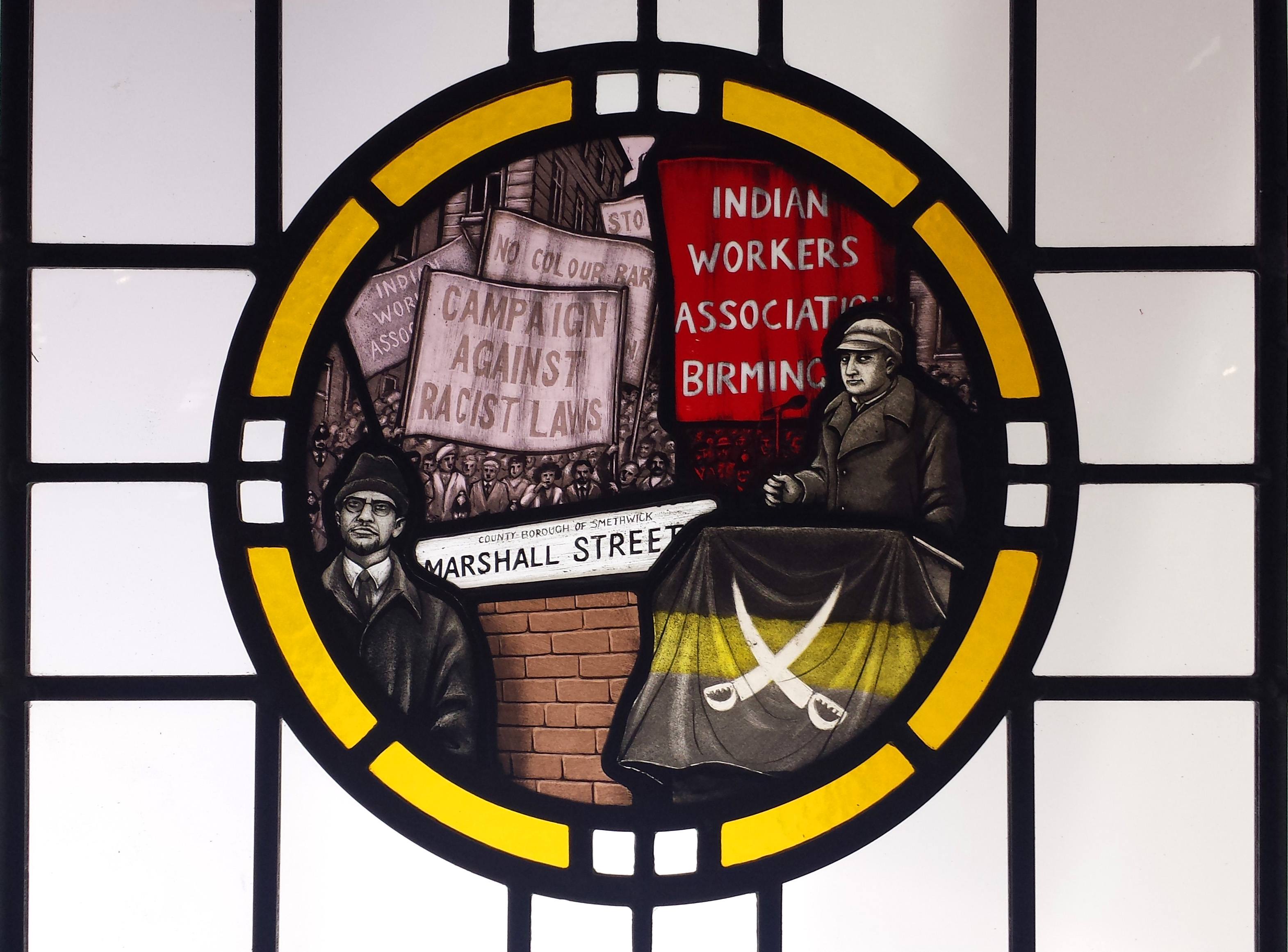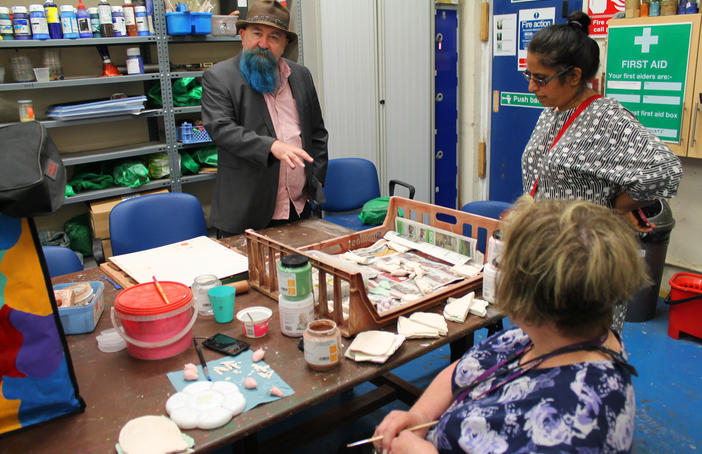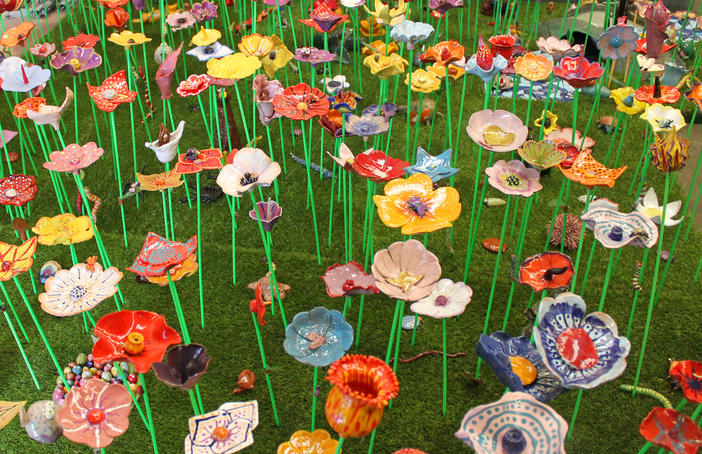MORE THAN A HUNDRED STORIES
More Than 100 Stories is a commission led by artists Sarah Butler and Nicole Mollet that explores and creatively maps the Creative People and Places programme.
Passion and Time in the Creative Black Country
On Tuesday 21 June, Sarah and Nicole visited Creative Black Country. Below is a conversation exploring their responses to the day. Main image taken from the 'Desi Pubs' project, stain glass by artist Steven Cartwright.

SB: The word that I came away with from our visit was 'passion': we met two women called Ann and Rita at Yew Tree community centre who put so much time and energy into making things happen on the estate; the people at Creative Arts who lit up talking about the ceramic garden. It was great to see how Creative Black Country have managed to 'tap into' that energy and enable new things to happen, for people to try something different, or work on a bigger scale. Sajida talked about CBC's motto 'making the most of...' which I think is such a strong approach, to work with the interests and passions of people living in the area, to catalyse and amplify that rather than start something new. Was there one word that you came away from the day with?
NM: In all the six different groups we visited I witnessed huge amounts of passion, but I would take it one step further. I would also call it a stoic passion. These are communities which have had to endure decades of industrial decline and lack of investment. They have been put down for the way they speak and labelled as an area of deprivation. It’s easy to be passionate when things are going your way, but it takes great strength to be passionate when life is tough. When discussing the idea to make a panto spoken in Black Country dialect, Ann said ‘We want to be proud of it, instead of being ashamed of it’.
Sajida explained that alongside the cash investment each of the groundworks projects, gets given the time of a specialist freelance arts coordinator; funded by Creative Black Country. Quite often people applying for the funding for the first time do not realise the value of this support. We met Yinka at the Yew Tree Community centre, who is helping the group there project manage and shape how the idea becomes a reality. This is more than just a funding opportunity, it is also the valuable time of a skilled advisor.
I was equally impressed by the discussion we had in the office with the core CBC team. They were keen to stress the importance of having the time to get to know the people. Martin said you need time to make friends with people. Going to meet project partners in the local pub on the weekend. Attending lengthy LEF meetings (local engagement forums). The idea of not just parachuting in a big idea quickly, but growing something slowly, from within the community. The Creative Arts ceramic garden project typified this for me. The fact the project leader Richard said ‘it wasn’t going to be this big, then suddenly all these people started getting involved’. Not to mention all the countless hours of time given by volunteers who keep so many of these great projects going, like Richard at Creative Arts (see image below).
So ‘Time’ would be my word.

By the way, Rita mentioned this film they helped make ‘Dances with Wolves’ see https://youtu.be/8jDc2tfsOp4 (a trio of grannie extroverts go and visit many of the CBC projects) I love the fact it is so unpretentious and funny. So many community art promos are full of contrived messages, stock photo moments and emotive sound tracks, and these kinds of marketing videos sometimes frame projects in a way which attempts to Disney-fy creative engagement. I prefer the rough edges kept in. Having said this, I know how important raising the profile of a project beyond the immediate local community, to share the experience with wider audiences. The style of film is just dependant on whom you are trying to impress.
NM: What do you think about the Landmark projects ‘Desi pubs’ venture to the South Bank Centre? What do you think doing that achieved?
SB: I think I'm probably not the right person to ask! But this theme of creating work from within the Black Country and then taking it further afield came up more than once during our visit, didn't it? Tongue Tied and Twisted, the storytelling and DJ production drawing on South Asian folktales, is touring across the UK and Dawinder mentioned international interest too (http://www.creativeblackcountry.co.uk/projects/project-articles/tongue-tied-twisted/). The team at Creative Arts talked about their ambition for the ceramic garden to travel nationally and internationally as well as locally (http://www.creativeblackcountry.co.uk/projects/project-articles/ceramic-...). This link between local work, rooted in communities and the specifics of the Black Country, and a broader audience is really exciting I think. It starts to break down those unhelpful distinctions between 'regional' and 'national' work which come with so many implicit value judgements. Taking the work created for and with the Desi pubs to the South Bank Centre speaks to that particular divide between London and 'the regions'. CPP's ambition is to increase access to and engagement with the arts in areas of low engagement, and to aspire to excellence in the process of engaging, and the art itself. I admire how the Desi pubs project is combining those two ambitions. (http://www.creativeblackcountry.co.uk/projects/project-articles/desi-pub...) and is raising awareness of the Black Country and its creativity in the heart of London's arts world.
SB: Did you have any other thoughts about the Desi pubs project in particular?
NM: Well I was there at the launch of the Alchemy Festival, in which Desi-pubs played a very prominent part. I just loved the fact that all the landlords made the effort to come down and attend the event. Jude Kelly did the introductions. She said many inspirational things, the one I wrote down was ‘if you can dream of a better world, you can make a better world’. You could see it on their faces, the pride, that their pub was being talked about at this major international festival. What they have achieved is certainly worth celebrating. Beera (proprietor of the Red Cow) has really transformed the pub, and the new painting he commissioned with the help of CBC honours that achievement.
SB: I was really struck by CBC's motto – making the most of... - it feels very strong and very appropriate, in terms of the relevance of the work and the sustainability of the changes the CPP programme is trying to create nationally. Did it strike you in the same way?
NM: Yes it did, the fact it openly acknowledges there is a long history of diverse culture and rich creativity in the area, and this project is here to enhance it not replace it.

Photo of part of the ceramic garden created by over 500 local people together with the Creative Arts group, who are based on an industrial estate in Oldbury.

Photo taken at one of the 'Tongue tied and Twisted' workshops run by Black Country Touring.
 Sarah Butler
Sarah Butler Nicole Mollett
Nicole MollettFilter by
DATE
- July 2016 (3)
- June 2016 (4)
- May 2016 (3)
- April 2016 (1)
- March 2016 (2)
- February 2016 (2)
- January 2016 (2)
- December 2015 (1)
- November 2015 (2)
- October 2015 (3)
- September 2015 (11)
- August 2015 (4)
- July 2015 (10)
TAGS
- - No value - (14)
- bait (1)
- Batley Festival (1)
- Bentley (1)
- change (1)
- collaboration (2)
- community (2)
- Confidence (4)
- Creative Scene (1)
- cycling (3)
- decision making (1)
- decisionmaking (1)
- Doncaster (1)
- drawing (2)
- East Durham Creates (1)
- engagement (1)
- flying (1)
- Funding (1)
- Glossary (1)
- Granby 4 Streets (1)
- Heart of Glass (3)
- Hull (1)
- In My Place (1)
- landscape (1)
- language (4)
- LeftCoast (2)
- Local (3)
- Manifesto (1)
- Mexborough (1)
- Passion (1)
- People (2)
- postcards (1)
- Process (1)
- quality (1)
- research (1)
- Right Up Your Street (1)
- Ronnie Hughes (1)
- Roots and Wings (1)
- Socially Engaged Art (1)
- Spectacle (1)
- Super Slow Way (2)
- targets (1)
- The Cultural Spring (1)
- Themes (1)
- time (4)
- trust (1)
- visibility (1)







